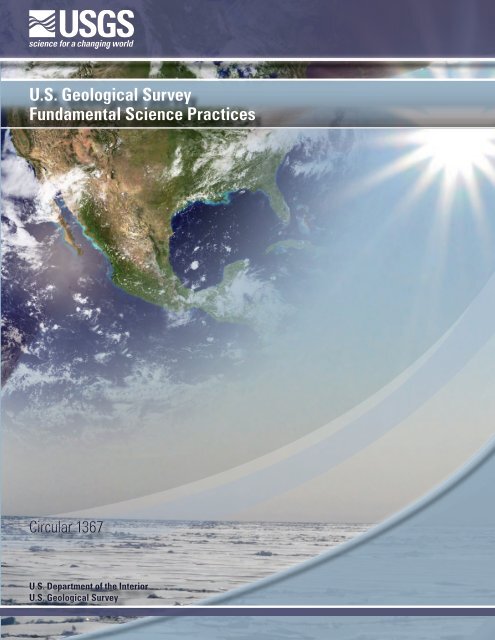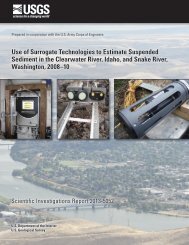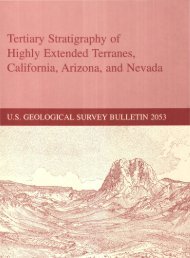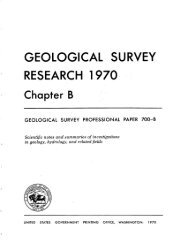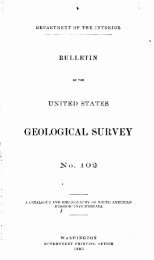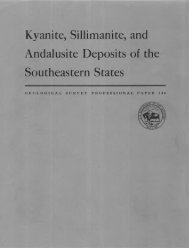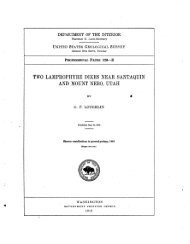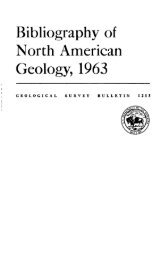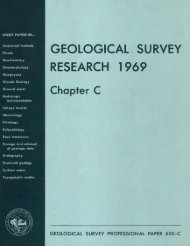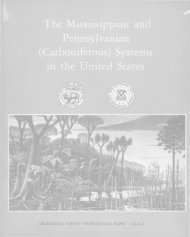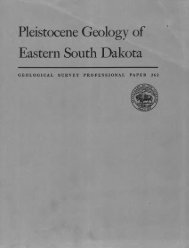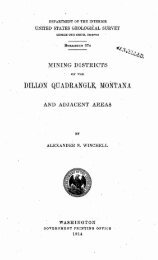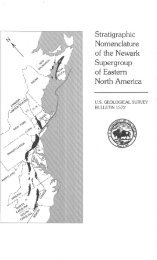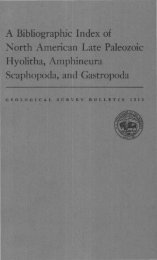U.S. Geological Survey Fundamental Science Practices - the USGS
U.S. Geological Survey Fundamental Science Practices - the USGS
U.S. Geological Survey Fundamental Science Practices - the USGS
Create successful ePaper yourself
Turn your PDF publications into a flip-book with our unique Google optimized e-Paper software.
U.S. <strong>Geological</strong> <strong>Survey</strong><br />
<strong>Fundamental</strong> <strong>Science</strong> <strong>Practices</strong><br />
Circular 1367<br />
U.S. Department of <strong>the</strong> Interior<br />
U.S. <strong>Geological</strong> <strong>Survey</strong>
U.S. <strong>Geological</strong> <strong>Survey</strong><br />
<strong>Fundamental</strong> <strong>Science</strong> <strong>Practices</strong><br />
By <strong>the</strong> <strong>Fundamental</strong> <strong>Science</strong> <strong>Practices</strong> Advisory Committee<br />
Circular 1367<br />
U.S. Department of <strong>the</strong> Interior<br />
U.S. <strong>Geological</strong> <strong>Survey</strong>
U.S. Department of <strong>the</strong> Interior<br />
KEN SALAZAR, Secretary<br />
U.S. <strong>Geological</strong> <strong>Survey</strong><br />
Marcia K. McNutt, Director<br />
U.S. <strong>Geological</strong> <strong>Survey</strong>, Reston, Virginia: 2011<br />
This and o<strong>the</strong>r <strong>USGS</strong> information products are available at http://store.usgs.gov/<br />
U.S. <strong>Geological</strong> <strong>Survey</strong><br />
Box 25286, Denver Federal Center<br />
Denver, CO 80225<br />
To learn about <strong>the</strong> <strong>USGS</strong> and its information products visit http://www.usgs.gov/<br />
1-888-ASK-<strong>USGS</strong><br />
Any use of trade, product, or firm names is for descriptive purposes only and does not imply endorsement by <strong>the</strong><br />
U.S. Government.<br />
Although this report is in <strong>the</strong> public domain, permission must be secured from <strong>the</strong> individual copyright owners to<br />
reproduce any copyrighted materials contained within this report.<br />
Suggested citation:<br />
<strong>Fundamental</strong> <strong>Science</strong> <strong>Practices</strong> Advisory Committee, 2011, U.S. <strong>Geological</strong> <strong>Survey</strong> <strong>Fundamental</strong> <strong>Science</strong> <strong>Practices</strong>:<br />
U.S. <strong>Geological</strong> <strong>Survey</strong> Circular 1367, 8 p.
Contents<br />
Background.....................................................................................................................................................1<br />
<strong>Fundamental</strong> <strong>Science</strong> <strong>Practices</strong> .................................................................................................................2<br />
FSP Web Sites .......................................................................................................................................2<br />
Roles and Responsibilities ..................................................................................................................2<br />
The Peer Review Process ............................................................................................................................6<br />
<strong>USGS</strong> Peer Review Requirements .....................................................................................................6<br />
Federal Peer Review Requirements .................................................................................................7<br />
The Bureau Approval Process.....................................................................................................................7<br />
Scientific Integrity .........................................................................................................................................7<br />
Functions Supporting FSP ............................................................................................................................7<br />
<strong>Science</strong> Publishing Network ..............................................................................................................7<br />
Information Product Data System .....................................................................................................8<br />
For More Information ...................................................................................................................................8<br />
<strong>Fundamental</strong> <strong>Science</strong> <strong>Practices</strong> Advisory Committee<br />
Cindi Barton, <strong>Science</strong> Center Director, Tacoma, Washington<br />
Terry D’Erchia, Assistant Director, Core <strong>Science</strong> Informatics, Denver, Colorado (past member)<br />
Keith Kirk, Bureau Approving Official, Santa Cruz, California<br />
Lenny Konikow, Publishing Scientist, Reston, Virginia<br />
Rama Kotra, Program Coordinator, Reston, Virginia<br />
Mike Jawson, <strong>Science</strong> Center Director, La Crosse, Wisconsin<br />
Bill Orem, Publishing Scientist, Reston, Virginia<br />
Phil Redman, IPDS Administrator, Madison, Wisconsin<br />
Carolyn Reid, Policy Coordinator, Reston, Virginia<br />
Jonathan Stock, Publishing Scientist, Menlo Park, California<br />
Tom Suchanek, Publishing Scientist, Sacramento, California<br />
Ione Taylor, Associate Director, Reston, Virginia<br />
Charles Van Riper III, Publishing Scientist, Tucson, Arizona<br />
Randy Updike, Area Executive, Denver, Colorado<br />
iii
U.S. <strong>Geological</strong> <strong>Survey</strong><br />
<strong>Fundamental</strong> <strong>Science</strong> <strong>Practices</strong><br />
By <strong>the</strong> <strong>Fundamental</strong> <strong>Science</strong> <strong>Practices</strong> Advisory Committee<br />
No matter what policies and guidelines are developed, <strong>the</strong> responsibility<br />
for science excellence remains where it has always been—in <strong>the</strong> hands<br />
and minds of <strong>the</strong> dedicated scientists of <strong>the</strong> <strong>USGS</strong>.<br />
—Charles G. Groat, 13th Director, <strong>USGS</strong><br />
Background<br />
The U.S. <strong>Geological</strong> <strong>Survey</strong> (<strong>USGS</strong>) was established during <strong>the</strong> final session of <strong>the</strong><br />
45th Congress by <strong>the</strong> Organic Act of March 3, 1879 (20 Stat. 394; 43 U.S.C. 31). The <strong>USGS</strong><br />
was placed in <strong>the</strong> Department of <strong>the</strong> Interior and was charged with a unique combination of<br />
responsibilities: “...classification of <strong>the</strong> public lands, and examination of <strong>the</strong> geological structure,<br />
mineral resources, and products of <strong>the</strong> national domain.” The legislation stemmed from a<br />
report by <strong>the</strong> National Academy of <strong>Science</strong>s, which in June 1878 had been asked by Congress<br />
to provide a plan for surveying <strong>the</strong> Territories of <strong>the</strong> United States that would secure <strong>the</strong> best<br />
possible results at <strong>the</strong> least possible cost. The necessity for communication of <strong>the</strong> best possible<br />
results led to <strong>the</strong> establishment of an ongoing tradition of internal and external publication of<br />
<strong>USGS</strong> information products and <strong>the</strong> longstanding <strong>USGS</strong> reputation for scientific excellence<br />
guided by <strong>the</strong> internal quality standards and processes applied when developing <strong>the</strong>se products.<br />
The <strong>USGS</strong> is an independent science agency that serves <strong>the</strong> Nation by providing reliable<br />
scientific information to describe and understand <strong>the</strong> Earth; minimize loss of life and property<br />
from natural disasters; manage water, biological, energy, and mineral resources; and enhance<br />
and protect our quality of life. With no regulatory or management mandate, <strong>the</strong> <strong>USGS</strong> is<br />
able to provide impartial science to address <strong>the</strong> needs of our changing world. A diversity of<br />
scientific expertise enables <strong>the</strong> <strong>USGS</strong> to carry out multiscale, multidisciplinary<br />
investigations that continue to add to <strong>the</strong> base of knowledge about <strong>the</strong><br />
Earth. Through <strong>the</strong>se efforts, <strong>the</strong> <strong>USGS</strong> provides citizens and decision<br />
makers at all levels of government with information needed to<br />
address critical societal issues. <strong>USGS</strong> Circular 1309, “Facing<br />
Tomorrow’s Challenges—U.S. <strong>Geological</strong> <strong>Survey</strong> <strong>Science</strong> in<br />
<strong>the</strong> Decade 2007–2017” (http://pubs.usgs.gov/circ/2007/1309/)<br />
describes current Bureau science emphases, all of which are<br />
supported by <strong>USGS</strong> <strong>Fundamental</strong> <strong>Science</strong> <strong>Practices</strong> (FSP).
2 U.S. <strong>Geological</strong> <strong>Survey</strong> <strong>Fundamental</strong> <strong>Science</strong> <strong>Practices</strong><br />
<strong>Fundamental</strong> <strong>Science</strong> <strong>Practices</strong><br />
The <strong>USGS</strong> has a long and proud tradition of objective,<br />
unbiased science in service to <strong>the</strong> Nation. A reputation<br />
for impartiality and excellence is one of our most<br />
important assets.<br />
To help preserve this vital asset, in 2004 <strong>the</strong> Executive<br />
Leadership Team (ELT) of <strong>the</strong> <strong>USGS</strong> was charged by <strong>the</strong><br />
Director to develop a set of fundamental science practices,<br />
philosophical premises, and operational principles as <strong>the</strong><br />
foundation for all <strong>USGS</strong> research and monitoring activities.<br />
In a concept document, “<strong>Fundamental</strong> <strong>Science</strong> <strong>Practices</strong><br />
of <strong>the</strong> U.S. <strong>Geological</strong> <strong>Survey</strong>,” <strong>the</strong> ELT proposed “a<br />
set of fundamental principles to underlie <strong>USGS</strong> science<br />
practices.” The document noted that protecting <strong>the</strong> reputation<br />
of <strong>USGS</strong> science for quality and objectivity requires <strong>the</strong><br />
following key elements:<br />
• Clearly articulated, Bureau-wide fundamental science<br />
practices.<br />
• A shared understanding at all levels of <strong>the</strong> organization<br />
that <strong>the</strong> health and future of <strong>the</strong> <strong>USGS</strong> depend on<br />
following <strong>the</strong>se practices.<br />
• The investment of budget, time, and people to ensure<br />
that <strong>the</strong> <strong>USGS</strong> reputation and high-quality standards<br />
are maintained.<br />
FSP encompass all elements of research investigations,<br />
including data collection, experimentation, analysis, writing<br />
results, peer review, management review, and Bureau<br />
approval and publication of information products. The<br />
focus of FSP is on how science is carried out and<br />
how products are produced and disseminated. FSP<br />
is not designed to address <strong>the</strong> question of what<br />
work <strong>the</strong> <strong>USGS</strong> should do; that is addressed in<br />
<strong>USGS</strong> science planning handbooks and o<strong>the</strong>r<br />
documents.<br />
Building from longstanding existing<br />
<strong>USGS</strong> policies and <strong>the</strong> ELT concept<br />
document, in May 2006, FSP policies<br />
(refer to http://www.usgs.gov/fsp/<br />
policies.asp) were developed<br />
with input from all parts<br />
of <strong>the</strong> organization and<br />
were subsequently<br />
incorporated into<br />
<strong>the</strong> Bureau’s <strong>Survey</strong> Manual. In developing an implementation<br />
plan for FSP policy, <strong>the</strong> intent was to recognize and incorporate<br />
<strong>the</strong> best of <strong>USGS</strong> current practices to obtain <strong>the</strong> optimum<br />
overall program for our science. In January 2009, <strong>the</strong> <strong>USGS</strong><br />
moved to full implementation of FSP. The FSP Advisory<br />
Committee (FSPAC) was formed to serve as <strong>the</strong> Bureau’s<br />
working and standing committee to ensure <strong>the</strong> objectivity and<br />
quality of <strong>the</strong> Bureau’s science information products and to<br />
provide support for <strong>the</strong> full implementation of FSP.<br />
FSP Web Sites<br />
The FSP Intranet site (http://internal.usgs.gov/fsp/<br />
policies.html) serves as a resource for <strong>USGS</strong> employees,<br />
particularly <strong>USGS</strong> scientists, supervisors, managers, reviewers,<br />
approving officials, and publishing professionals. The Intranet<br />
site helps <strong>USGS</strong> employees find <strong>the</strong> information and guidance<br />
<strong>the</strong>y need to ensure that we are continually maintaining <strong>the</strong><br />
objectivity and quality of <strong>USGS</strong> science and how information<br />
products are developed, reviewed, approved, and released.<br />
The FSP Internet site (http://www.usgs.gov/fsp/) is <strong>the</strong><br />
primary resource for our stakeholders, partners, and <strong>the</strong> public<br />
to obtain information about FSP. The site provides users with<br />
quick and easy navigation to FSP policy and procedural<br />
and guidance materials.<br />
Roles and Responsibilities<br />
FSP are <strong>the</strong> collective and shared responsibility of<br />
everyone in <strong>the</strong> <strong>USGS</strong>. Designated officials and offices have<br />
specific roles, authorities, and functions in establishing <strong>the</strong><br />
policies that underpin <strong>the</strong>se practices:<br />
• The Director of <strong>the</strong> <strong>USGS</strong> has final authority<br />
and responsibility for FSP and for <strong>the</strong> excellence,<br />
integrity, and objectivity of <strong>USGS</strong> science and of its<br />
information products.<br />
• Associate Directors set policy for how scientific<br />
investigations, research, and activities are carried out<br />
and how information products are reviewed and<br />
approved for release and dissemination. They provide<br />
oversight for <strong>the</strong> processes and policies that govern FSP.<br />
They collaborate with Area Executives to address issues<br />
or take corrective action with regard to <strong>the</strong>se policies.<br />
• The Office of <strong>Science</strong> Quality and Integrity<br />
executes FSP policies, including <strong>the</strong> appointment of<br />
officials who approve information products for release<br />
(refer to http://www.usgs.gov/usgs-manual/200/205-18.<br />
html). This Office collaborates with Associate Directors<br />
and Area Executives to address issues or take corrective<br />
action regarding <strong>the</strong> execution of <strong>the</strong>se policies<br />
and maintains <strong>the</strong> policy documents and<br />
procedures that pertain to FSP.
<strong>USGS</strong> information products that are reviewed and<br />
approved in accordance with FSP policies follow a standard<br />
workflow (p. 4–5) that includes o<strong>the</strong>r specific roles and<br />
responsibilities as follows:<br />
• <strong>Science</strong> Center Managers or <strong>the</strong>ir equivalents<br />
ensure that standards for scientific quality are met;<br />
that is, methodology is documented, and accepted<br />
metadata standards are used. They determine if a<br />
planned product qualifies as influential scientific<br />
information or highly influential scientific assessment<br />
(as defined in <strong>the</strong> Office of Management and Budget<br />
(OMB) directive available at http://www.usgs.gov/<br />
peer_review/) and <strong>the</strong>refore must adhere to <strong>the</strong><br />
OMB requirements for peer review of influential<br />
products. They ensure that only properly peer<br />
reviewed products are forwarded to Bureau Approving<br />
Officials (for products that contain new interpretive<br />
information) and alert <strong>the</strong>se officials about potential<br />
high-visibility products or policy-sensitive issues.<br />
They have delegated authority for Bureau Approval<br />
of information products that do not contain new<br />
interpretive information, all abstracts (except extended<br />
abstracts), and all poster and presentation materials<br />
disseminated to <strong>the</strong> public or left with <strong>the</strong> meeting<br />
sponsor. They also ensure that information products<br />
conform to <strong>USGS</strong> publishing requirements (refer to<br />
SM Part 1100, Publishing at http://www.usgs.gov/usgsmanual/t500.html#pubs)<br />
and that official<br />
records are archived at <strong>the</strong>ir<br />
centers or placed in<br />
<strong>Fundamental</strong> <strong>Science</strong> <strong>Practices</strong><br />
<strong>the</strong> Information Product Data System (IPDS)<br />
document vault.<br />
• Bureau Approving Officials are responsible for using<br />
consistent and uniform practices for information<br />
product review and approval across <strong>the</strong> Bureau.<br />
They ensure that appropriate peer review has been<br />
sought and applied, that authors have considered and<br />
adequately responded to peer review comments, and<br />
that <strong>the</strong> product is clear in its presentation with <strong>the</strong><br />
intended audience in mind. They ensure that strict<br />
objectivity regarding <strong>the</strong> relation of science to public<br />
policy is upheld, thus preserving <strong>the</strong> reputation of <strong>the</strong><br />
<strong>USGS</strong> as a source of high-quality and policy-relevant<br />
but policy-neutral science. They alert appropriate<br />
officials and offices of <strong>the</strong> progress of policy-sensitive<br />
or high-visibility information products that are<br />
likely to be of interest or potentially controversial<br />
to <strong>the</strong> Bureau, <strong>the</strong> Department of <strong>the</strong> Interior, and<br />
o<strong>the</strong>r Federal agencies; State, local, and Tribal<br />
governmental organizations; <strong>the</strong> scientific community;<br />
<strong>the</strong> public; and any specific industry or interest. They<br />
communicate effectively with one ano<strong>the</strong>r and with<br />
Associate Directors and Area Executives to share<br />
knowledge and expertise relative to review, approval,<br />
and release practices. They grant Bureau Approval on<br />
behalf of <strong>the</strong> Director. They share <strong>the</strong> Bureau Approval<br />
responsibility, one acting on behalf of ano<strong>the</strong>r as<br />
needed and in accordance with <strong>the</strong>ir<br />
educational background and<br />
science expertise.<br />
3
4 U.S. <strong>Geological</strong> <strong>Survey</strong> <strong>Fundamental</strong> <strong>Science</strong> <strong>Practices</strong><br />
U.S. <strong>Geological</strong> <strong>Survey</strong> <strong>Fundamental</strong> <strong>Science</strong> <strong>Practices</strong> (FSP)<br />
Information Product Workflow<br />
Author<br />
Supervisor<br />
2.<br />
1.<br />
Author prepares first draft of<br />
information product, a metadata<br />
record is created in <strong>the</strong> <strong>USGS</strong><br />
Information Product Data System<br />
(IPDS), and draft manuscript is<br />
forwarded to supervisor with<br />
recommendations for<br />
peer reviewers.<br />
Supervisor reviews manuscript to<br />
determine if it is ready for peer<br />
review, accepts author’s suggested<br />
reviewers, or identifies o<strong>the</strong>r peer<br />
reviewers, monitors whe<strong>the</strong>r<br />
manuscript could be considered<br />
as influential scientific information<br />
or highly influential scientific<br />
assessment for <strong>the</strong> OMB Peer<br />
Review Agenda process.<br />
<strong>Science</strong> Center Manager<br />
Bureau Approving Official<br />
6.<br />
5.<br />
4.<br />
3. Author receives peer review<br />
comments, modifies manuscript,<br />
and prepares reconciliation<br />
documentation. Author forwards<br />
revised manuscript, peer reviews,<br />
and reconciliation documentation<br />
to supervisor.<br />
Supervisor determines whe<strong>the</strong>r<br />
response to peer review is<br />
adequate, and whe<strong>the</strong>r editorial<br />
review is required and <strong>the</strong>n<br />
forwards to <strong>Science</strong> Center (SC)<br />
Manager or equivalent.<br />
SC Manager or equivalent reviews all<br />
documentation and, if appropriate,<br />
forwards package to Bureau<br />
Approving Official (BAO) for approval.<br />
BAO ensures all required reviews are performed,<br />
validates peer review reconciliation, identifies<br />
any revisions needed, and returns (for additional<br />
review or revision) approved or unapproved<br />
package to SC Manager or equivalent.
8.<br />
7.<br />
Author responds to revisions<br />
recommended and (or)<br />
required by BAO.<br />
SC Manager or equivalent<br />
sends package to author for<br />
appropriate action.<br />
9.<br />
Approved manuscript is<br />
submitted for internal release<br />
(<strong>USGS</strong> Series) or for external<br />
publication and citation, and<br />
related metadata are entered<br />
into IPDS by author or alternate.<br />
FSP Information Product Workflow<br />
5
6 U.S. <strong>Geological</strong> <strong>Survey</strong> <strong>Fundamental</strong> <strong>Science</strong> <strong>Practices</strong><br />
• The Senior <strong>USGS</strong> Author (or <strong>the</strong> first <strong>USGS</strong> author<br />
in instances of collaborative external publications) is<br />
responsible for ensuring that appropriate <strong>USGS</strong> review<br />
and approval of information products occur prior to<br />
public release. Authors suggest peer reviewers and<br />
inform <strong>the</strong>ir supervisors and Approving Officials if<br />
changes in drafts of products require or warrant<br />
fur<strong>the</strong>r review and approval prior to publication.<br />
• The Senior <strong>USGS</strong> Author’s Supervisor collaborates<br />
with <strong>the</strong> <strong>Science</strong> Center Manager to determine if a<br />
planned information product qualifies as influential<br />
scientific information or highly influential scientific<br />
assessments. The supervisor accepts <strong>the</strong> author’s<br />
suggested peer reviewers or identifies o<strong>the</strong>r qualified<br />
reviewers and facilitates transmission of <strong>the</strong> manuscript<br />
package to peer reviewers. The supervisor also ensures<br />
that peer reviews are adequate, that all review comments<br />
are addressed by <strong>the</strong> author (that is, addressed in a<br />
reconciliation document), and forwards <strong>the</strong> manuscript<br />
to <strong>the</strong> <strong>Science</strong> Center Manager or equivalent.<br />
• The FSP Advisory Committee (FSPAC) reports to<br />
<strong>the</strong> Director’s Office and coordinates closely with <strong>the</strong><br />
Office of <strong>Science</strong> Quality and Integrity. The FSPAC was<br />
established in 2008 and is <strong>the</strong> Bureau’s<br />
working and standing advisory<br />
committee charged<br />
with monitoring<br />
full implementation of FSP. Members of <strong>the</strong> FSPAC<br />
include scientists, <strong>Science</strong> Center Managers, Bureau<br />
Approving Officials, and publishing managers.<br />
Membership is deliberately broad to provide optimum<br />
benefit from various perspectives across <strong>the</strong> Bureau<br />
and to ensure continuity of FSP. The FSPAC is <strong>the</strong><br />
primary contact for questions and concerns regarding<br />
FSP and serves as a resource to <strong>USGS</strong> management by<br />
offering recommendations and advice to help ensure<br />
that <strong>the</strong> Bureau continues to produce high-quality,<br />
objective science information products. The FSPAC<br />
conducts periodic reviews to determine how FSP<br />
policy and practices are working to quantify benefits<br />
and assess <strong>the</strong> added value to <strong>the</strong> Bureau.<br />
The Peer Review Process<br />
<strong>USGS</strong> Peer Review Requirements<br />
Peer review, as a cornerstone of scientific practice,<br />
validates and ensures <strong>the</strong> quality of published <strong>USGS</strong> science.<br />
Also referred to as “refereeing,” “technical<br />
peer review,” or “scientific peer<br />
review,” peer review is<br />
scrutiny of work or
ideas by one or more scientists (peers) who are sufficiently<br />
well qualified, who are without conflict of interest, and who<br />
are not associated with <strong>the</strong> work being performed. A peer<br />
is defined as one who is of equal standing with ano<strong>the</strong>r; in<br />
science, <strong>the</strong> implication is that education and (or) experience<br />
qualify one to comment on <strong>the</strong> work of o<strong>the</strong>rs in a particular<br />
field of expertise. Peer reviewers may be internal or external<br />
to <strong>the</strong> <strong>USGS</strong>.<br />
Peer review is required for all information products,<br />
regardless of media (print, digital, audiovisual, or Web),<br />
• whe<strong>the</strong>r published and disseminated by <strong>the</strong> <strong>USGS</strong> or<br />
by an outside entity,<br />
• whe<strong>the</strong>r <strong>the</strong> work was funded in whole or in part by<br />
<strong>the</strong> <strong>USGS</strong>,<br />
• and as long as <strong>USGS</strong> affiliation is identified with<br />
authorship (refer to http://www.usgs.gov/usgsmanual/500/502-3.html).<br />
In keeping with practices in <strong>the</strong> broader scientific<br />
community, directives from Government authorities, and<br />
FSP, <strong>the</strong> following, in part, is <strong>USGS</strong> peer review policy:<br />
• Peer reviews must include at least two qualified<br />
scientists who have no stake in <strong>the</strong> outcome of <strong>the</strong><br />
review, who are not associated with <strong>the</strong> work being<br />
performed, and who are without conflict of interest.<br />
• Only peer-reviewed information products may be<br />
forwarded to an Approving Official for Bureau<br />
Approval. Information products sent to an Approving<br />
Official must include reconciliation documentation<br />
indicating how review comments were addressed.<br />
Federal Peer Review Requirements<br />
The OMB directive, Final Information Quality Bulletin<br />
for Peer Review, dated December 16, 2004, requires that <strong>the</strong>re<br />
be a “systematic process of peer review planning” and access<br />
to a list of information products for official dissemination<br />
that will be peer reviewed as ei<strong>the</strong>r influential scientific<br />
information or highly influential scientific assessments (as<br />
defined in <strong>the</strong> OMB directive). The OMB requirements do<br />
not replace or duplicate <strong>the</strong> <strong>USGS</strong> peer review requirements.<br />
The <strong>USGS</strong> has <strong>the</strong> responsibility to maintain and conduct <strong>the</strong><br />
appropriate peer review process for its products and to identify<br />
products as influential according to <strong>the</strong> OMB definitions.<br />
A list of <strong>USGS</strong> information products peer reviewed<br />
as influential scientific information or highly influential<br />
scientific assessments can be found at http://www.usgs.gov/<br />
peer_review/.<br />
The Bureau Approval Process<br />
All information products must receive review and<br />
approval by line supervisors of <strong>the</strong> senior <strong>USGS</strong> author<br />
before subsequently receiving final Bureau Approval. Bureau<br />
Approval validates <strong>the</strong> scientific excellence of <strong>the</strong> information<br />
product and includes a policy review to ensure that all policy<br />
requirements relevant to FSP are met and to identify policysensitive<br />
issues including those that may have implications<br />
related to current policy or that may involve matters of<br />
national interest, security, or potential commercial gain.<br />
Bureau Approval also ensures that all appropriate reviews,<br />
such as peer review, have been conducted. Review of products<br />
for Bureau Approval addresses criteria such as integrity and<br />
objectivity, conflict of interest, impartiality and nonadvocacy,<br />
methodology and documentation, public benefit and access,<br />
natural hazards, and (or) public or wildlife health. Delegations<br />
of authority to officials who grant Bureau Approval are<br />
detailed in <strong>the</strong> <strong>Survey</strong> Manual (http://www.usgs.gov/usgsmanual/200/205-18.html).<br />
Scientific Integrity<br />
In January 2007, <strong>USGS</strong> released a policy on<br />
scientific integrity (refer to http://www.usgs.gov/usgsmanual/500/500-25.html)<br />
that describes our requirements<br />
“for ensuring scientific integrity in <strong>the</strong> conduct of scientific<br />
activities and procedures for reporting, investigating, and<br />
adjudicating allegations of scientific misconduct by <strong>USGS</strong><br />
employees and volunteers.” The policy contains a “code of<br />
scientific conduct” that not only documents research standards<br />
but also assures customers, partners, and <strong>the</strong> general public<br />
that <strong>USGS</strong> abides by <strong>the</strong>m in all aspects of scientific work<br />
performed. A <strong>USGS</strong> Scientific Misconduct/Integrity Review<br />
Panel has also been in place since 2007.<br />
Functions Supporting FSP<br />
<strong>Science</strong> Publishing Network<br />
Functions Supporting FSP<br />
Building upon its reputation for publishing excellence,<br />
<strong>the</strong> <strong>USGS</strong> implemented a Bureau-wide publishing approach<br />
through <strong>the</strong> <strong>Science</strong> Publishing Network (SPN) that<br />
directly supports all employees of <strong>the</strong> <strong>USGS</strong> as well<br />
as <strong>the</strong> many partners, suppliers, and consumers of<br />
7
8 U.S. <strong>Geological</strong> <strong>Survey</strong> <strong>Fundamental</strong> <strong>Science</strong> <strong>Practices</strong><br />
<strong>USGS</strong> data and information products and services. Production<br />
support is coordinated at Publishing Service Centers located<br />
across <strong>the</strong> Nation, thus ensuring workload balancing and<br />
optimizing network efficiencies throughout <strong>the</strong> Bureau.<br />
SPN services include technical and scientific editing,<br />
graphics support, publication layout and design, Web and<br />
print release of all <strong>USGS</strong> series publications, and customized<br />
support for o<strong>the</strong>r <strong>USGS</strong> products including abstracts, posters,<br />
journal articles, books, presentation materials, Web pages,<br />
internal documents, and outreach materials. Additional<br />
information on <strong>USGS</strong> publishing is available at<br />
http://www.usgs.gov/publishing/.<br />
Information Product Data System<br />
The standard workflow steps for products that are<br />
reviewed and approved in accordance with FSP requirements<br />
(p. 4–5) have been incorporated into IPDS, <strong>the</strong> Bureau’s<br />
official tracking system for managing <strong>the</strong> development steps<br />
of <strong>USGS</strong> information products that require Bureau Approval.<br />
IPDS workflows track and document <strong>the</strong> review and approval<br />
process as it occurs. The resulting IPDS workflow history<br />
Prepared by <strong>the</strong> <strong>USGS</strong> Lafayette Publishing Service Center<br />
provides documentation to show that proper procedures have<br />
been followed and that <strong>the</strong> necessary steps have been taken.<br />
IPDS also manages <strong>the</strong> documents that support <strong>the</strong> review and<br />
approval process. Peer review comments, author peer review<br />
reconciliation documents, and o<strong>the</strong>r archival records that are<br />
stored in IPDS provide documentation of compliance with<br />
FSP and, in accordance with <strong>USGS</strong> requirements (http://www.<br />
usgs.gov/usgs-manual/schedule/432-1-s1/index1.html) and<br />
<strong>the</strong> National Archives and Records Administration, satisfy<br />
requirements for storing <strong>the</strong>se documents. IPDS is used to<br />
document and certify that Bureau Approval has been granted.<br />
For More Information<br />
The primary sources of FSP information for <strong>USGS</strong><br />
employees are <strong>the</strong>ir immediate supervisors, <strong>Science</strong> Center<br />
Managers, Bureau Approving Officials, and <strong>the</strong> internal FSP<br />
Web site. Additionally, <strong>USGS</strong> employees, as well as all o<strong>the</strong>r<br />
parties, should contact <strong>the</strong> FSPAC (by email at gs_fspac@<br />
usgs.gov) for FSP-related questions and concerns or visit <strong>the</strong><br />
public FSP Web site at http://www.usgs.gov/fsp/.
<strong>Fundamental</strong> <strong>Science</strong> <strong>Practices</strong> Advisory Committee—U.S. <strong>Geological</strong> <strong>Survey</strong> <strong>Fundamental</strong> <strong>Science</strong> <strong>Practices</strong>—Circular 1367


